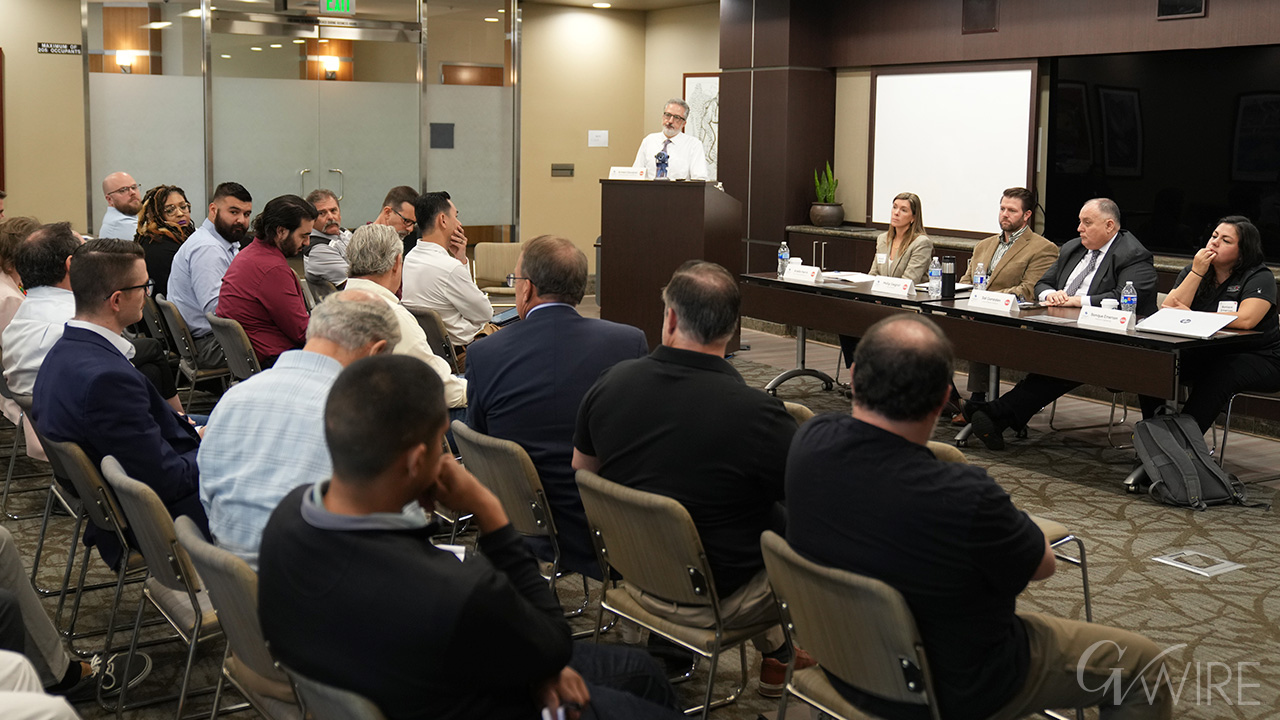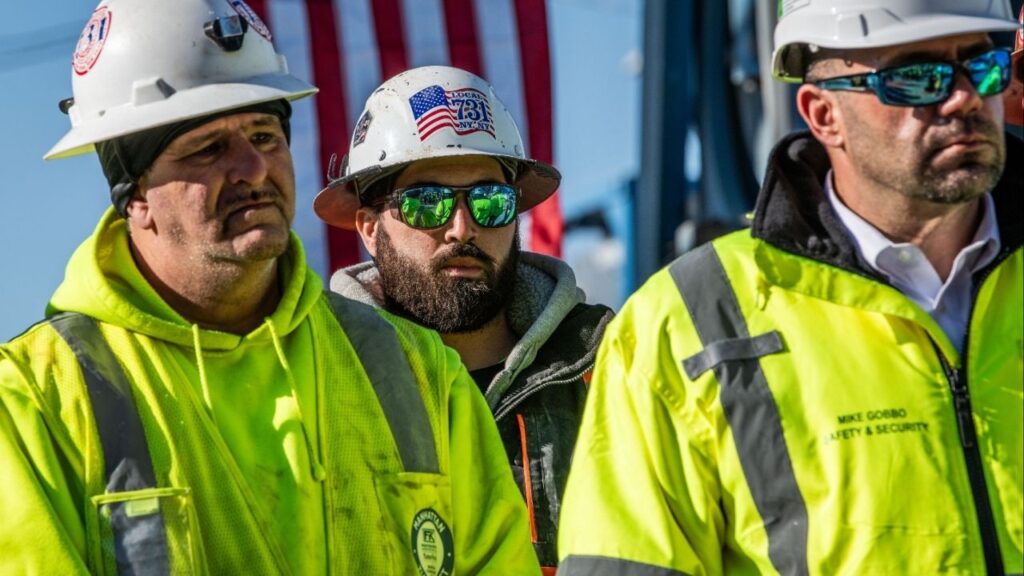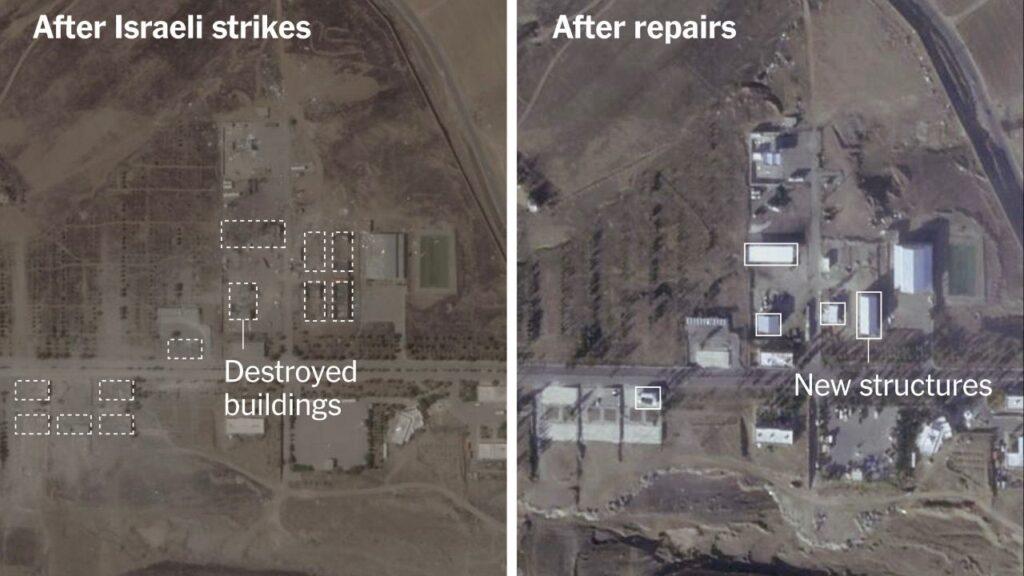Public review processes open up a world of potential obstacles for approval of manufacturing plants. Developers want accelerated reviews similar to what some housing projects now get in California. (GV Wire Composite/Paul Marshall)

- A panel of experts discussed how to navigate getting industrial job centers approved in California and in Fresno.
- Businesses want 12 month approval times, said real estate broker Ethan Smith.
- More and more, housing projects bypass public review processes. Business owners want the same for their projects.
Share
When experts talk about how manufacturers can best bring their businesses to Fresno, the need for faster approval times is a common thread.
Industrial broker Ethan Smith with Newmark Pearson Commercial on Thursday told a business group that Arizona, Texas, and Nevada need only a year to make things happen.
Thus, Smith said, the question is, “How do we get approval processes in the city of Fresno down to 12 months?”
The timeframe is nowhere close to that now.
Studying how much traffic a project might bring takes at least that long, said Bonique Emerson, former city planner and current vice president of Precision Civil Engineering.
The answer repeatedly brought up? Create designated zones and objective standards in Fresno eliminating the need for discretionary review.
On Thursday, the Fresno Business Council, the San Joaquin Valley Manufacturing Alliance, and the American Institute of Architects hosted a conference discussing how manufacturing businesses can navigate the complicated approval process in state and local jurisdictions.
Armen Devejian, principal architect at Associated Design & Engineering, emceed the event.
“Development in the city of Fresno is a critical part of our economic success, and we want to support our manufacturers and other business owners that are seeking to expand their operation or develop new facilities,” Devejian said. “The best way to do that is to know the wheelhouse in which they work.”
Housing and Manufacturing in Conflict
In California especially, manufacturing can be one of the most heavily regulated businesses. Land use attorney Arielle Harris with Cox, Castle, & Nicholson said the majority of legislation making it easier to build in California surrounds housing.
“We still need to secure land for jobs and we can’t forget about that,” Harris said at the conference.
But housing and manufacturing often come in conflict. People living near even near light industrial businesses — think warehouses and some limited manufacturing — bemoan truck traffic, noise, and emissions. Cities and counties often have their unique regulations on how those businesses can build.
The 2024 law AB 98 created a uniform statewide standard for how businesses near schools or homes have to be built. This year, legislators are working on a revise to clarify holes in that law, Harris said.
Sal Gonzalez, president of Lance Kashian & Co., said environmental groups are better organized than business interests.
“Until we do the work to impact the policymakers, it will continue on,” Gonzalez said.

Busseto Pulls Project From Fresno After Lawsuit
Mike Betts, owner of Betts Company, said career technical education programs in Fresno have created a plentiful, qualified workforce for manufacturers. The problem is getting businesses to locate to Fresno.
“We have the best CTE programs anywhere in the nation for construction and manufacturing jobs, but we can’t build,” Betts said.
Environmental review processes — intended to protect the quality of life in surrounding neighborhoods — can take years and cost hundreds of thousands of dollars. But, even with approval, a project stall or be abandoned because of litigation.
The example came up of Italian meat processor Busseto Foods, which wanted to expand across the street to a vacant property in 2022. The project would have brought 160 jobs, according to the Business Journal.
The vacant 20-acre parcel across the street from Busseto’s existing facility was zoned away from industrial after the city approved the Southwest Fresno Specific Plan.
To build there required a rezone and to do so, the city held several community meetings to let residents know about the project, said Philip Siegrist, planning manager for the city.
Busseto invited community members and councilmembers to their existing plant to show what the project would look like. The business promised money to rehabilitate the nearby Cecil C. Hinton Community Center, Devejian added.
But after the Fresno City Council approved the rezone, a Bay Area labor group threatened a lawsuit, demanding hundreds of thousands of dollars from Busseto.
Busseto abandoned the project and decided to build in New Jersey.
Siegrist said they often see these tactics after project approvals.
“They’re looking to either cut a deal or get a payout,” Siegrist said.
Housing Gets Automatic Approval, Can Manufacturing?
Outlining objective standards for builders to abide by could avoid much litigation, Emerson said.
Many communities hesitate at objective design standards because oftentimes it means giving up discretion on picking which projects to an area, Emerson said.
“To me, discretionary means anything can happen,” Emerson told the group.
Apartments often also stir community opposition. However, Assembly Bill 2011 allowed “by right” zoning for apartments in some commercial corridors, exempting them from the state’s landmark California Environmental Quality Act law.
The Fresno City Council discussed allowing multifamily projects to avoid a public approval process earlier this year called “ministerial approval.” That effort failed in a 4-3 decision.
Harris said manufacturers need to petition the state for tools similar to housing projects.
“A lot of the tools built for housing should be applied to manufacturing, but it needs to be done through policy,” Harris said.
RELATED TOPICS:
Categories

$16 Billion Hudson River Tunnel Project Begins to Wind Down

Suicide Bomber Kills 31 in Shi’ite Mosque in Pakistan’s Capital

Luigi Mangione Faces June 8 Trial in State Case Over CEO Killing

Valley Crime Stoppers’ Most Wanted Person of the Day: Jeetpal Singh

Trump Shares Racist Video Depicting Obamas as Apes














